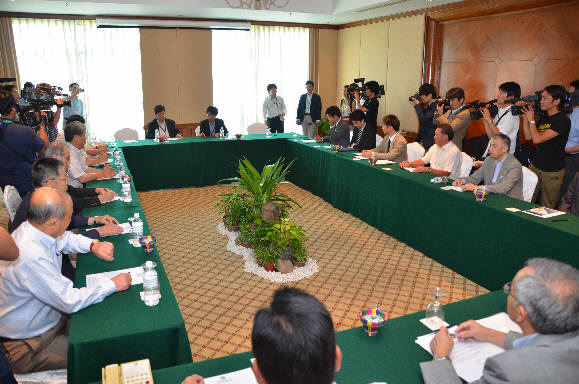Satomi Tamai – Kota Kinabalu, Malaysia
Japan received a briefing on Wednesday, July 24, by other members of the Trans-Pacific Partnership free trade negotiations about the current status of the talks.
As Japan became the 12th member in the already over 3-year-old negotiations the day before, the TPP participants specially arranged the “Japan session” to help Japan catch up with the negotiations. They were briefed on 7 fields, including market access covering tariff elimination, out of 21 fields covered under the pact, and briefings on the remaining fields will be given on the following day.
In the session scheduled until Thursday, July 25, Japanese negotiators hope they can explain the country’s fundamental position based on the government’s pledge to protect its sensitive agricultural products by retaining tariffs on those products while seeking to eliminate trade barriers to boost its exports of manufactured goods.
“We expect to ask various questions and present our opinions there,” Japan’s chief negotiator Koji Tsuruoka told reporters before the session.
But with little time left in the current round of talks, it would be difficult for them to address their negotiating stance in detail, as they will be busy analyzing the documents of past negotiations which they gained access of after official admission to the negotiating table.
After the session, Kazuhisa Shibuya, Japan’s deputy chief domestic coordinator for TPP negotiations went only as far as saying that they hope to hold “constructive discussions” concerning Japan’s fundamental policies for negotiation.
Referring to the tariffs on the 5 key agricultural products which Japan deems sensitive, Shibuya said that full-scale discussion on the issue is yet to start, indicating that there still remains room for negotiation. Asked whether Japan can maintain tariffs on the products, Shibuya said the Japanese negotiators “will negotiate to realize the national interest as a whole by strategically using the offensive and defensive tactics at the right place.”
Shibuya refused to comment on whether the Japanese negotiators explained that the upper and lower houses of the Diet adopted resolutions concerning the TPP talks, saying that he cannot specifically describe what they have talked about.
Regarding the documents of past negotiations which Japan obtained the day before, Shibuya said that there is no indication so far that they will not be able to participate in the rule-making process on the key topics of interest for the country.
The first day of the Japan session dealt with 7 fields including market access, textiles, sanitary and phytosanitary measures, investment and financial services. Briefings on the rest of the negotiation fields will be given on Thursday, July 25, the last day of the Malaysia round of talks.
In the morning of Wednesday, July 24, before the Japan session, Tsuruoka attended the chief negotiator session and received explanations on the procedures of the negotiations and discussed how to proceed with the talks in the future.
Other Japanese negotiators attended meetings of working groups on 4 fields, including government procurement to discuss bid requirements for public works projects, and rules of origin which deals with requirements to qualify for reduced tariff benefits.
On the sidelines of the talks, the Japanese government held a briefing session for some 20 Japanese stakeholders including agriculture and business organizations who are visiting Malaysia to gather information on the talks. Some 40 participants of the session included officials of organizations of stockbreeders and sugar manufacturers, the Japan Business Federation (Keidanren), the Japan Chambers of Commerce and Industry and the Japanese Trade Union Confederation (Rengo).

Japanese government officials give a briefing on TPP negotiations to Japanese stakeholders on Wednesday, July 24, in Kota Kinabalu, Malaysia.
According to the participants, the government officials explained that since Japan signed a confidentiality agreement in joining the talks, they cannot disclose what they and negotiators of other countries have addressed in the negotiations.
The negotiators told stakeholders that they will provide information that can be provided, and also called on them to share the information they have gathered separately from stakeholders of other countries.
Participants of the session expressed concern over the secrecy of the negotiations. An official of the Japan Pork Producers Association who attended the session commented that information disclosed was insufficient. A Keidanren official said they want to continue making efforts to grasp the situation of the negotiations. An official of the Japanese Chambers of Commerce and Industry said they asked the negotiators to disclose as much information as possible.
Hiroshi Oe, Japan’s deputy chief negotiator, told reporters on Tuesday, July 23, that it is their mission to disclose information which can be disclosed, but that they cannot disclose what should be kept confidential because it goes against the confidentiality agreement.
(July 25, 2013)

